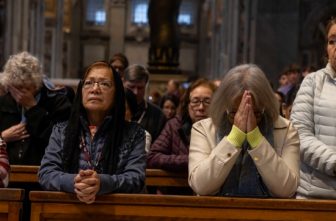Q. Recently, our bishop spoke about how cold and unwelcoming some parishes can seem. I recall one instance where I asked our priest to meet with three family members and myself (all of us regular parishioners) to try to resolve some personal matters that we had. I was shocked when he told me that family counseling was not a part of his training unless it involved a matter of religion, which it did not. He had no suggestions as to where I could seek help and seemed bothered that I had even brought the matter to his attention.
My husband and I have been so put off by his response that we have not been to church since. Where does the Church stand on parish priests counseling their parishioners?
A. I agree with the priest on the matter, but not (if your portrayal is accurate) on his manner. Very few parish priests are trained thoroughly in the science or art of counseling as a professional psychiatrist or psychologist might be.
Often in my own 50 years in the priesthood, I have declined to take on the role of primary counselor for someone with deep-seated issues, for example, acute marital conflict, a long history of family tensions or even suicidal thoughts. I felt that it would have been irresponsible to assume an identity far beyond my skill set.
What I have tried to do, though — and what I think is always a priest’s obligation — is to show sympathy and a desire to help. I regularly refer parishioners to our diocesan counseling center with its trained staff of professionals.
What I sometimes do, too, when I think an inquirer might find it more comfortable, is to meet with a person initially, try to clarify the issues and offer support, and then make the contact myself with our center to arrange an appointment for the one in need.
I do want to comment on your decision to stop going to church because of the way you were treated. I disagree with the priest, as I have mentioned, and I apologize for his evident lack of concern. But the only one you are hurting now is yourself — by depriving yourself of the strength of the sacraments. Why not just pick a different parish?
Q. We have a new pastor who several times already has brought up the notion of tithing. He says that, as Catholics, we are called to give 10 percent of our annual gross income to charity, and he promises us that “God will not be outdone in generosity.”
Can you explain the Church’s teaching on tithing: Is it really a requirement, like Sunday Mass attendance, that Catholics tithe? The Catechism of the Catholic Church simply says that the faithful “have the duty of providing for the material needs of the Church, each according to his abilities” (No. 2043). I agree, but we also have to balance that against our responsibility to provide for the material needs of our children.
A. The practice of tithing was formally established in the Torah, the Jewish law of the Old Testament. A person offered to God, by giving to the Temple, one-tenth of the harvest of grain of the fields or the produce of fruit of the trees. That practice carried over into the early centuries of the Church’s history, and in the eighth century, Charlemagne made tithing to the Church a civil law.
Today there is no obligation for Catholics to donate a specific fraction of their income — only, as you mention, the general obligation that all Catholics should, to the extent of their abilities, contribute to the material support of the Church.
In addition to the passage you cite from the Catechism of the Catholic Church, the Church’s Code of Canon Law says that “the Christian faithful are obliged to assist with the needs of the Church so that the Church has what is necessary for divine worship, for the works of the apostolate and of charity” (Canon 222.1).
Studies have shown that Catholics typically give between 1 percent and 2 percent of their income to local parishes, but to that figure must be added the considerable donations made to religious orders as well as to Catholic hospitals and Catholic Charities, which make up the largest private network of health care and social service agencies in America.
Father Doyle writes for Catholic News Service. A priest of the Diocese of Albany, New York, he previously served as director of media relations for the U.S. Conference of Catholic Bishops. Questions may be sent to askfatherdoyle@gmail.com and 40 Hopewell St., Albany, NY 12208.




